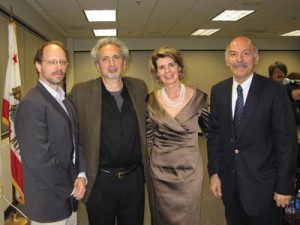Suren Oganessian
Staff Writer

Photo: ASP Archive
During the month of April one can usually find many lectures on the Armenian Genocide. Often it is politicians who share their knowledge, but on Friday, April 13, Peter Balakian, renowned Armenian-American author, shared his perspectives on Genocide and poetry at Fresno State.
Balakian, an award-winning poet and advocate for Armenian Genocide recognition, was awarded the 2012 Alice and Clifford Spendlove Prize for Social Justice, Diplomacy and Advocacy at UC Merced on Thursday, April 12. Previous recipients of the Spendlove Prize include former California Supreme Court Justice Cruz Reynoso and former President Jimmy Carter. Balakian is the seventh honoree of the Prize.
Armenian Studies Program Coordinator Prof. Barlow Der Mugrdechian and Fresno State Associate Vice President of University Communication, Shirley Armbruster, nominated Balakian for the prize.
Every year the Spendlove Prize honors an individual who “exemplifies the delivery of social justice, diplomacy and tolerance through his or her work.” Balakian, a professor of English and director of Creative Writing at Colgate University, has written frequently on the Turkish government’s campaign to exterminate the Armenian people in World War I.
“Peter Balakian has been called ‘the American conscience of the Armenian Genocide,’” said Sherrie Spendlove, who established the prize in honor of her parents, lifelong Merced residents Alice and Clifford Spendlove.
Balakian is the author of five poetry books, a memoir titled Black Dog of Fate, and the nonfiction book The Burning Tigris: The Armenian Genocide and America’s Response.
Balakian was invited to speak by the Armenian Studies Program at Fresno State, in conjunction with UC Merced. He made two presentations, one in the afternoon at Fresno State, and a second to a larger community gathering at the UC Merced center.
At the Fresno State event he spoke to an audience of mostly students and faculty, discussing the impact that the Armenian Genocide had on modernity. This was a theme he expanded upon at the evening lecture.
Balakian felt that it was important to contextualize the Genocide within other social and historical events going on at the time, and to examine the impact it had on future events, such as providing a template for the Holocaust during World War II.
Balakian argued that historical amnesia regarding the Armenian Genocide is what allowed the Holocaust to happen, referenced by Hitler himself in his famous 1939 quote on the topic. This was not only caused by the deliberate whitewashing of history by Turkey, but by a generation of Armenians who had been left shell-shocked and unable to speak about the experience.
The main focus of his presentation was on the advent of modernity in the form of advanced technology and communication, which facilitated the Genocide.
On this note, Balakian segued into speaking about his literary work, much of which is based on trans-generational memory, the way trauma can be passed across generations. Peter Balakian’s grandmother was a Genocide survivor, and Balakian read three of his poems, “Road to Aleppo 1915,” “Ellis Island,” and “World War Two,” which chronicled different times in her life—during the Genocide, later as an immigrant coming to America, and the paranoia she suffered after World War II, when she began having flashbacks of her traumatic past. These poems were written in the 1970’s, before the experience of the Genocide had been thoroughly explored through poetry.
“All writers can be witnesses, you don’t have to have been there,” said Balakian when explaining what it was like to write about something he had never witnessed firsthand.
Balakian’s visit to Fresno State provided a special opportunity for students, but especially aspiring writers, to interact with the author and to hear his views on literature and writing.
 Hye Sharzhoom Armenian Action
Hye Sharzhoom Armenian Action